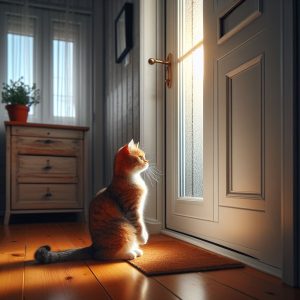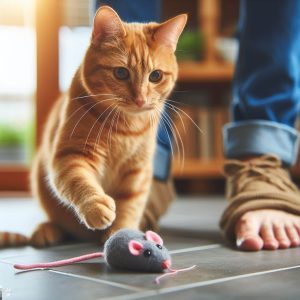If your cat has diarrhea but is still active and eating normally, it can be puzzling and concerning. While mild, intermittent diarrhea may not be a major worry, ongoing or severe diarrhea can lead to dehydration, nutrient deficiencies, and other health issues for your feline friend.
When a cat’s poop is loose, watery, or mucus-filled, but they otherwise appear fine, several factors could be at play. Diet, digestive upset, stress, infections, parasites, medication, or underlying conditions can all cause diarrhea. So what should you look out for, and when is vet care needed?
This in-depth guide covers common causes, home treatment tips, warning signs not to ignore, and everything cat owners should know about mysterious loose stools. Arm yourself with the knowledge to assess diarrhea episodes and act fast when it really counts. With the right info, you can hopefully resolve minor cases safely at home, while also spotting signs of serious illness requiring the vet’s input.
Common Causes Of Random Diarrhea In Cats
Diarrhea that crops up suddenly but doesn’t impact your cat’s usual appetite or energy levels is typically caused by:
Dietary Indiscretion
Cats are infamous for eating random, unsuitable objects that can irritate their digestive system or simply overwhelm it. Things like:
- Spoiled food from the garbage
- Non-food items like string, rubber bands, tinsel, etc
- New treats or people food in amounts their tummy can’t handle
This triggers intestinal inflammation and excess mucus production as the body tries to flush out the irritation and offenders. Normally cats learn what doesn’t agree with them, but the occasional slip up can still cause loose stools, even if kitty seems fine otherwise.
Abrupt Diet Change
Sudden transitions between cat foods, or from one brand of food to another can disrupt your cat’s digestive balance. Their gut flora and enzymes are accustomed to breaking down certain proteins and carbohydrates. So when those food substances change overnight, it can cause tummy troubles.
Inflammatory Bowel Disease (IBD)
IBD involves chronic intestinal inflammation and malabsorption issues. It may cause random soft stools between periods of normal bowel movements. IBD can be tricky to diagnose and requires imaging tests and intestinal biopsies. Cats may have recurrent diarrhea, but often appear comfortable and maintain a good appetite.
Parasites
Worms, protozoa like giardia or coccidia, and other intestinal parasites can all lead to loose stools. Young kittens with immature immune systems are most prone to parasites. But cats who hunt or have fleas can also pick up worms and protozoa. These bugs irritate the bowel lining and prevent proper nutrient absorption.
Bacterial or Viral Infections
Feline panleukopenia virus, salmonella bacteria, campylobacter, and other infectious bugs can invade the gut and wreak havoc. Diarrhea, sometimes containing blood or mucus, is a common symptom, even though the cat may seem energetic.
Medication Side Effects
Antibiotics, steroids, chemotherapy drugs, and other medications can disrupt the intestinal environment. This allows gas, fluid and irritants to build up, creating loose stools as a medication side effect. Normally your cat will adjust within a few days, but consult your vet if severe diarrhea persists.
Stress or Anxiety
For some cats, emotional or environmental stress manifests in digestive upset and diarrhea. New homes, loud noises, construction, visitors, travel, or introducing new pets can cause this stress-linked diarrhea. Their stools normalize once the trigger is removed.
Food Allergies or Intolerances
Allergies to specific ingredients like certain proteins, grains, or additives can damage the intestinal lining and impair digestion. Diarrhea arises, but cats don’t always vomit or show skin issues as other allergy symptoms. Trouble could come and go depending on diet variations.
Other Diseases
Thyroid disease, diabetes, kidney disease, cancer, and other chronic health conditions may come with loose stools as a secondary symptom. Often the diarrhea arises due to the disease altering digestion, nutrient absorption, hydration levels and more.
Home Treatment Tips For Mild Diarrhea
In uncomplicated cases of diarrhea with no other symptoms, try these home treatment steps:
Switch To A Simple, Low-Residue Diet
For 1-3 days, transition your cat to a bland, easily digestible diet like boiled chicken and white rice. Limit fats, spices, people food tidbits, and dairy products as these can further irritate the GI tract. Low residue foods leave less undigested material to irritate the colon during diarrhea episodes.
Keep Your Cat Hydrated
Dehydration is dangerous with diarrhea, so encourage your cat to drink. Leave out extra fresh water bowls. Add water to wet food. Offer meat baby food with added water. Use cat milk or bone broth as hydrating treat options.
Consider Probiotic Supplements
Probiotics containing beneficial gut bacteria can help restore balance to the digestive system. FortiFlora and Purina Pro Plan Veterinary Diets Probiotics are popular options. Ask your vet for a recommended probiotic and proper dosage.
Try A Small Amount Of Canned Pumpkin
Plain canned pumpkin (not pie filling mix) contains fiber that can firm up loose stools. Give 1-3 teaspoons and watch for improvement over 1-2 days. Too much can make constipation worse though.
Check The Litter Box
Monitor if diarrhea worsens, stool amounts or frequency changes, you see blood or blackish stool, diarrhea lasts over 48 hours, or additional symptoms arise like vomiting, appetite loss, or lethargy. These are signs to get vet assistance.
Use Metamucil
For short bouts of diarrhea, try mixing a teaspoon of plain, unflavored Metamucil into your cat’s food. The extra fiber can soak up excess moisture in the colon and make stools more solid. Consult your vet first though.
Limit Fatty Foods
High-fat diets increase stool transit time and can worsen diarrhea. Stick to low-fat meats, limit oil, and avoid greasy people foods while your cat has loose stools. Gradually reintroduce fattier items once stools normalize.
Consider Activated Charcoal
In some cases of acute diarrhea, activated charcoal supplements can help soak up toxins or irritants. Check with your vet on dosage and duration. Stop use if constipation develops.
When To Visit The Vet For Diarrhea
While home monitoring is fine for mild diarrhea, see the vet promptly if you notice:
- Repeated diarrhea over 24 hours
- Weight loss from poor nutrient absorption
- Lethargy, weakness, or depression
- Loss of appetite lasting over 12 hours
- Vomiting combined with diarrhea
- Significant gas or flatulence
- Dehydration – dry gums, eyes, weakness, lack of skin elasticity
- Visible worms or parasites in stool
- Blood or blackish stool
- Diarrhea persists over 48 hours on bland diet and probiotics
Puppies and kittens under 6 months old should see the vet sooner, as diarrhea can become dangerous quicker in younger pets.
Seek ER care immediately if your cat has a bloated, painful abdomen alongside diarrhea, as this can indicate a life-threatening emergency like a gastrointestinal obstruction or perforation.
Diagnosing The Underlying Cause
To identify what’s causing your cat’s diarrhea when they otherwise seem fine, the vet will:
- Do a physical exam and assess hydration status
- Take the full history of symptoms
- Ask about diet, environment, stressors, and history of illness
- Collect a fecal sample for microscopy and laboratory testing
- Run bloodwork looking for indicators of infection, parasites, organ issues, etc.
- Potentially do imaging tests – X-rays, ultrasound, endoscopy
- Possibly perform a biopsy if IBD or cancer is suspected
Stool samples can identify parasites like giardia, coccidia or worms. Bloodwork helps find or rule out kidney disease, diabetes, pancreatitis, etc. Imaging and biopsies confirm intestinal thickening, swelling, foreign objects, masses, and other issues not always evident through physical exam alone.
Treating Diarrhea Based On The Cause
Depending on the diagnosis, the vet may recommend:
Medication
- Antibiotics for infections
- Anti-parasite drugs to kill intestinal worms, giardia, coccidia
- Steroids or other drugs for IBD
- Medication adjustment if it’s a side effect
- IV fluids or supplements for dehydration
Diet Changes
- Special gastrointestinal food
- Allergy formula food trial
- Long term bland diet
- Prescription low residue food
Further Testing
- Repeat fecal tests to confirm parasite elimination
- Ultrasound, endoscopy or other imaging procedures
- Biopsy for microscopic examination of tissue
Monitoring At Home
- Recording stools and symptoms
- Following their recommended home treatment steps
- Returning for follow up visits as needed
With prompt vet care and suitable treatment, most cats with diarrhea can recover fully and have normal stools again. In more chronic cases like IBD or food allergies, long term management may be needed.
When To Worry About Repeated Diarrhea
While an isolated bout of loose stools may not be concerning, repeat diarrhea episodes can indicate an underlying chronic problem requiring diagnosis. See your vet if diarrhea keeps returning periodically.
Potential reasons for recurrent diarrhea include:
- Chronic infections
- Persistent parasites
- Inflammatory bowel disease (IBD)
- Food allergies or intolerances
- Metabolic diseases like hyperthyroidism
- Cancer or polyps in the intestinal tract
- Chronic kidney or liver disease
- Irritable bowel syndrome (IBS)
Cats with recurring diarrhea tend to get traced back to IBD, food sensitivity, infection, or cancer as the root cause. But first ruling out other conditions through vet exams, bloodwork, stool analysis, and imaging helps pinpoint what’s really going on.
Can I Give My Cat Imodium Or Pepto-Bismol For Diarrhea?
Imodium (loperamide) and Pepto-Bismol can help treat diarrhea in humans, but they are not safe for cats.
Do not give your cat any over-the-counter anti-diarrhea medication without checking with your veterinarian first. Many contain ingredients that are toxic to cats.
For example, Imodium’s active ingredient loperamide can cause dangerously high blood pressure, seizures, coma, and even death in cats and dogs if an incorrect high dose is given.
Pepto-Bismol contains salicylate, which is toxic to cats, causing nausea, vomiting, and even liver damage.
Plus, anti-diarrhea medication may only mask symptoms while allowing the underlying problem to worsen.
Instead, call your vet for advice and safe anti-diarrhea medication options for your specific cat. They will advise you based on the cause and your cat’s age, weight, and health status.
Your vet may recommend probiotics, fiber supplements, prescription gastrointestinal food, and hydration support rather than over-the-counter diarrhea meds.
Homemade Remedies To Avoid
When dealing with diarrhea, well-meaning cat owners often want to try homemade remedies. However, many folk remedies are ineffective at best or downright dangerous for cats:
✘ Avoid dairy products like yogurt or cottage cheese. Most cats are lactose intolerant. The sugar and fat found in dairy makes diarrhea worse.
✘ Avoid herbal remedies like oregano oil, garlic, ginger, licorice root, coneflower, or other herbs unless specifically prescribed by your vet. Herbs can cause toxic side effects in cats.
✘ Avoid grapes, raisins, nuts, onion, chives, alcohol, chocolate, coffee, salt. These foods are all toxic for cats.
✘ Avoid carrots, greasy broth, bread. These can make diarrhea worse.
✘ Avoid apple cider vinegar or coconut oil. Too much acidity and fat upsets their digestion further.
Stick with the bland diet, probiotics, canned pumpkin, hydration methods and other tips your vet recommends. Only give medications approved for cats. When in doubt if something is safe, call your vet first before trying it.
How To Clean Up Diarrhea Accidents
Dealing with cat diarrhea inside the home can be messy and frustrating. But thorough clean up is important to prevent the smell from encouraging repeat accidents. Here are some tips:
- First remove all stool you can see by hand with gloves or paper towels. Try not to smoosh or smear the diarrhea around further.
- Next use an enzymatic cleaner like Nature’s Miracle designed to destroy odor molecules and bacteria in pet stains. Avoid using any cleaning products with strong chemical fumes.
- For carpet, apply cleaner liberally to the spot, allowing it soak in for 5-10 minutes. Then blot the area with clean towels. Do not rub, which can further grind in bacteria.
- On tile, hardwood, furniture, blot diarrhea up then spray on cleaner. Let sit briefly before wiping away all residue.
- Rinse the spot with clean water and extract excess moisture if possible. Use carpet powder or baking soda to absorb odors once spot is clean.
- Open windows and run a fan to help dry the area faster. The odor should neutralize once bacteria is removed and spot dries fully.
Repeat cleaning if any smell lingers. That indicates more bacteria to eliminate. Change cat litter daily during diarrhea episodes. Keep your cat in a contained room with easy to clean floors until stool returns to normal.
Preventing Diarrhea In The Future
While occasional diarrhea is normal, you can take steps to limit episodes:
- Feed scheduled meals rather than free feeding
- Make diet changes gradually over 4-7 days
- Limit people food, dairy, and table scraps
- Treat parasites preventively
- Reduce stressors like loud noise or dogs nearby
- Keep litter boxes extremely clean
- Ensure your cat stays well hydrated
- Have fresh water available at all times
- Monitor their bathroom habits for changes
- Keep annual vet exams up to date
Through proper nutrition, stress reduction, and proactive healthcare, you can help your cat have good digestive health and minimal diarrhea flare ups.
When To Seek Emergency Care
Diarrhea is considered an emergency if your cat shows these symptoms:
- Prolonged repeated vomiting
- No urine production for 12+ hours
- Very dark urine or straining to urinate
- Bloated or painful abdomen
- Abdominal tenderness, wound, or swelling
- Gums that are tacky or dry when pressed
- Collapsing episodes or inability to stand
- Seizures or uncontrollable shaking
- Sudden behavior changes – aggression or vocalizing
Rarely, severe dehydration, shock, blood chemical imbalances, intestinal rupture or obstruction, or even heart conditions can occur due to diarrhea. Seek emergency vet care immediately if your cat has diarrhea along with concerning systemic symptoms or abdominal pain. A sick cat can deteriorate quickly, so prompt veterinary treatment is vital.
The Takeaway On Diarrhea: Monitor Closely But Don’t Panic
Seeing sudden diarrhea can be disturbing for cat parents. But try not to worry excessively if your cat still acts normal otherwise.
Cats’ digestive systems are quite sensitive. So they can experience loose stools from minor dietary indiscretions, stress, or small infection exposure. Mild diarrhea often resolves on its own or with simple home treatment.
However, any worsening diarrhea or additional symptoms do warrant a quick call to the vet. They can assess your cat and help you determine whether it’s a minor upset or something more serious. With diarrhea, it’s better to be safe than sorry and have a veterinary expert ensure good health.
Monitor litter box habits closely and document what you see. Follow vet recommendations diligently if medication or diet changes are prescribed. And never hesitate to call if you feel your cat needs to be seen urgently – always trust your instincts.
With proactive observation and care, episodes of diarrhea will pass and your cat will be back to normal bowel movements and good health. Consistent attention ensures you catch more serious cases early. So try not to stress too much over minor diarrhea – just take smart action when needed. Your cat will be back to their regular playful, cuddly self before you know it!



